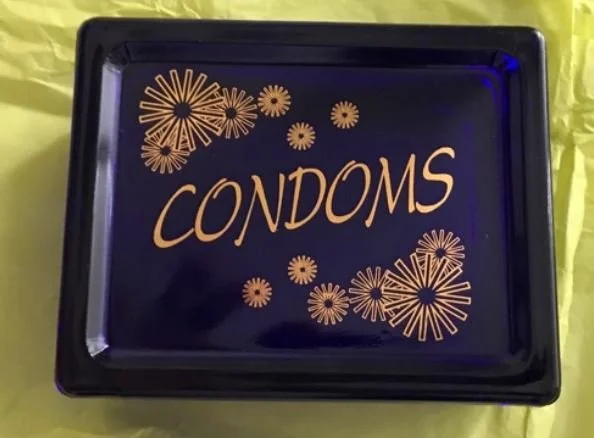Vaccine, safe sex keys to keeping levels of monkeypox low
Sidney Metzger, Community Health Network AIDS Clinic social worker, kept this cobalt blue glass condom jar on her desk in 1990. Credit: Dr. William Valenti.
Like experts in any number of fields, infectious disease specialists get together for a week each year and talk about what’s happening. I was invited to review some of what was published about monkeypox virus, which has been a major topic since the outbreak of MPV in different countries.
While monkeypox isn’t new, the current pattern of person-to-person transmission is something we haven’t seen.
The first cases were reported only in May 2022. Since August, cases have been decreasing, according to the Centers for Disease Control and Prevention. Still, the updated worldwide total since the outbreak was first identified is 75,822 cases. Of those, 28,244 have been reported in the United States, an explosive and disruptive outbreak.
While the decrease in cases is encouraging, CDC has stated that the virus could spread indefinitely at low levels in the U.S. Monkeypox is unlikely to go away completely in the near future.
Several areas of concern include possible transmission in congregate settings, among people who are homeless, household transmission, health care workers, and people with compromised immune systems. Research continues into what are the real risks for people in these populations.
So far, more than 95% of people affected are men who have sex with men. Dr. Agam Rao of the CDC noted that monkeypox has also been diagnosed in cisgender and transgender women, children, and men who do not report recent sex with other men.
Cases in children younger than 12 are suspected to be from household transmission. These cases serve as a reminder of the suspected role of bedding, towels and possibly surfaces, and the importance of making sure people with active infection aren’t sharing those items and are not in other situations where they can spread the virus.
As for how monkeypox affects people who have compromised immune systems, Dr. Boghuma Titanji of Emory University in Atlanta noted that patients with HIV had more lesions and had a more prolonged course of illness than others. Dr. Tijani noted that HIV and other STI testing is warranted in patients who have monkeypox, citing similar modes of transmission for those viruses.
In order to stay ahead of outbreaks, current guidelines call for vaccination for people at higher risk:
You are a man who has sex with other men, or if you are a transgender or nonbinary person and in the past 6 months have had any of the following: A new diagnosis of one or more sexually transmitted diseases including acute HIV, chancroid, chlamydia, gonorrhea, or syphilis; more than one sex partner.
You are a person who in the past 6 months has had any of the following: Sex at a commercial sex venue (like a sex club or bathhouse); sex at an event, venue, or in an area where monkeypox transmission is occurring.
You are a person whose sexual partner identifies with any of the above scenarios.
You are a person who anticipates experiencing any of the above scenarios.
My thinking is that the combination of vaccine and safer sex interventions have contributed to the decrease in new infections. CDC also notes that immunity has probably increased among some groups of men who have sex with men.
However, it is too early to let our guard down. A recent report in the journal Nature reminds us that the sustained virus spread in this current outbreak represents a unique transmission pattern. The person to person spread in the current multinational outbreak is unlike the sporadic pattern of previous MPV outbreaks seen in Africa, where spread is from animals to people.
The best course of action is to stay vigilant, promote safer sex practices, and continue to vaccinate. Vaccine efforts should be sex-positive and should avoid stigma.
This post first appeared in Doximity.

